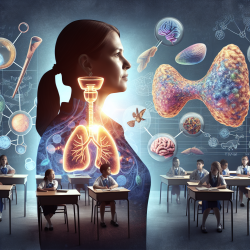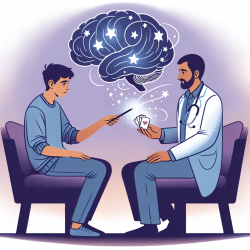The intricate dance of hormones and brain development is a field that continues to captivate researchers and educators alike. Recent studies have brought to light the critical role that thyroid hormones play in cerebral and cerebellar cortical development, with significant implications for understanding autism spectrum disorders (ASD). As special education practitioners, integrating these insights into our practices can enhance our ability to support students with ASD and potentially mitigate some developmental challenges.
The Evo-Devo Approach: A New Lens on Brain Development
The evolutionary developmental biology (evo-devo) approach provides a unique perspective on how developmental processes have evolved across species. This approach is particularly useful in understanding the role of thyroid hormones in brain development. Thyroid hormones are vital for regulating growth and maturation in various organs, especially the central nervous system (CNS), from fetal stages through adulthood.
Research indicates that maternal thyroid hormone deficiency can significantly increase the risk of ASD in children. This finding underscores the importance of adequate thyroid hormone levels during pregnancy for healthy brain development. The evo-devo approach helps us appreciate the conserved mechanisms across species that are crucial for proper brain organization and function.
Implications for Autism Spectrum Disorders
The morphological changes observed in mouse models of developmental hypothyroidism resemble brain lesions found in children with autism. This similarity has led researchers to explore how maternal thyroid hormone deficiencies might contribute to ASD. By understanding these connections, educators can advocate for better prenatal care and early interventions that address thyroid health.
Furthermore, studies have shown that thyroid hormone deficiencies can lead to various neurological disorders beyond ASD, including attention deficit-hyperactive disorder (ADHD) and dyslexia. This broad impact highlights the need for comprehensive approaches in special education that consider underlying hormonal influences.
Practical Steps for Educators
- Stay Informed: Regularly update your knowledge through webinars, conferences, and publications focused on neurodevelopmental research.
- Advocate for Early Screening: Encourage early screening for thyroid hormone levels during pregnancy as part of routine prenatal care.
- Collaborate with Healthcare Professionals: Work closely with pediatricians and endocrinologists to ensure students receive appropriate assessments and interventions related to thyroid health.
- Integrate Findings into IEPs: Use insights from research to inform Individualized Education Programs (IEPs), tailoring strategies to support students with ASD effectively.
- Promote Nutritional Awareness: Educate parents about the importance of adequate iodine intake during pregnancy, which is crucial for thyroid hormone synthesis.
Encouraging Further Research
The current body of research provides a foundation, but there is still much to learn about the complex interactions between thyroid hormones and brain development. Special education practitioners can play a pivotal role by participating in research studies or collaborating with academic institutions to further explore these connections.
By staying engaged with ongoing research, educators can contribute to a deeper understanding of ASD etiology and improve educational outcomes for students affected by these disorders.
To read the original research paper, please follow this link: An Evo-Devo Approach to Thyroid Hormones in Cerebral and Cerebellar Cortical Development: Etiological Implications for Autism.










